For the 2025 school year, there is 1 public preschool serving 428 students in Tuscumbia City School District.
Public Preschools in Tuscumbia City School District have a diversity score of 0.53, which is less than the Alabama public preschool average of 0.63.
Minority enrollment is 36% of the student body (majority Black), which is less than the Alabama public preschool average of 48% (majority Black).
Overview
This School District
This State (AL)
# Schools
6 Schools
648 Schools
# Students
1,600 Students
310,670 Students
# Teachers
92 Teachers
18,546 Teachers
Student : Teacher Ratio
17:1
17:1
District Rank
Tuscumbia City School District, which is ranked within the top 50% of all 145 school districts in Alabama (based off of combined math and reading proficiency testing data) for the 2021-2022 school year.
The school district's graduation rate of 90-94% has stayed relatively flat over five school years.
Overall District Rank
#70 out of 145 school districts
(Top 50%)
(Top 50%)
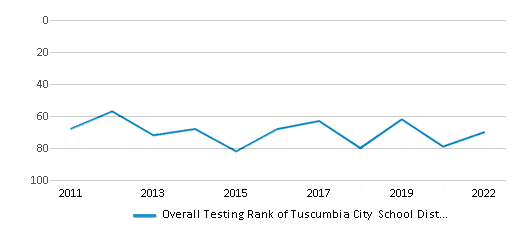
Math Test Scores (% Proficient)
25%
29%
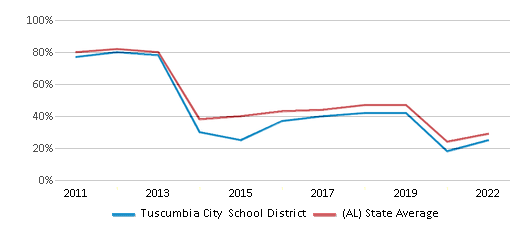
Reading/Language Arts Test Scores (% Proficient)
44%
47%
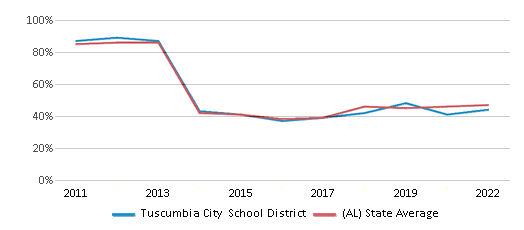
Science Test Scores (% Proficient)
31%
38%
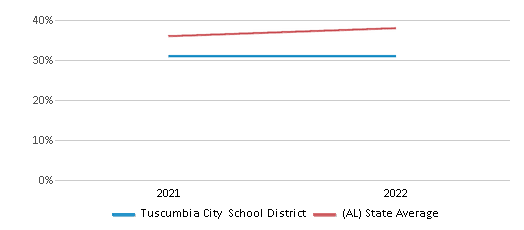
Graduation Rate
90-94%
88%
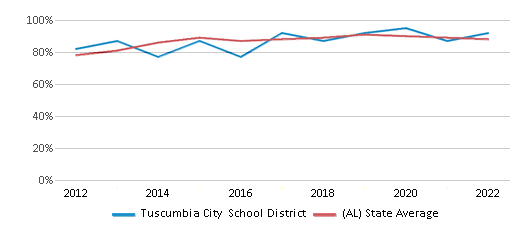
Students by Ethnicity:
Diversity Score
0.53
0.63
# American Indian Students
6 Students
3,275 Students
% American Indian Students
n/a
1%
# Asian Students
4 Students
3,474 Students
% Asian Students
n/a
1%
# Hispanic Students
55 Students
33,026 Students
% Hispanic Students
4%
11%
# Black Students
404 Students
93,822 Students
% Black Students
25%
30%
# White Students
1,019 Students
162,634 Students
% White Students
64%
52%
# Hawaiian Students
2 Students
315 Students
% Hawaiian Students
n/a
n/a
# Two or more races Students
110 Students
14,124 Students
% of Two or more races Students
7%
5%
Students by Grade:
# Students in PK Grade:
36
21,304
# Students in K Grade:
136
49,720
# Students in 1st Grade:
135
50,373
# Students in 2nd Grade:
121
48,594
# Students in 3rd Grade:
140
40,410
# Students in 4th Grade:
106
36,751
# Students in 5th Grade:
109
31,378
# Students in 6th Grade:
106
12,553
# Students in 7th Grade:
115
4,421
# Students in 8th Grade:
124
4,401
# Students in 9th Grade:
134
2,950
# Students in 10th Grade:
121
2,768
# Students in 11th Grade:
122
2,555
# Students in 12th Grade:
95
2,492
# Ungraded Students:
-
-
District Revenue and Spending
The revenue/student of $12,273 in this school district is less than the state median of $13,006. The school district revenue/student has grown by 27% over four school years.
The school district's spending/student of $11,254 is less than the state median of $12,220. The school district spending/student has grown by 6% over four school years.
Total Revenue
$20 MM
$9,671 MM
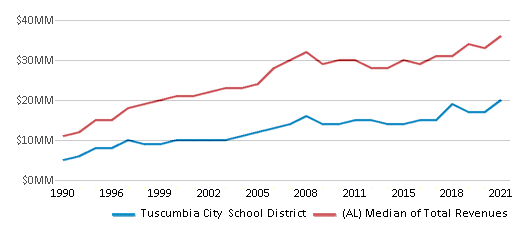
Spending
$18 MM
$9,086 MM
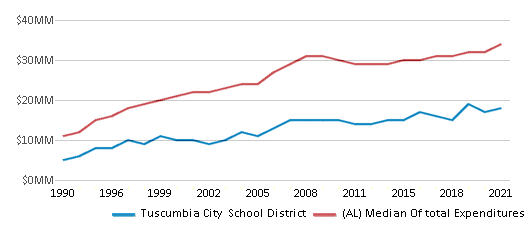
Revenue / Student (19-20)
$12,273
$13,006
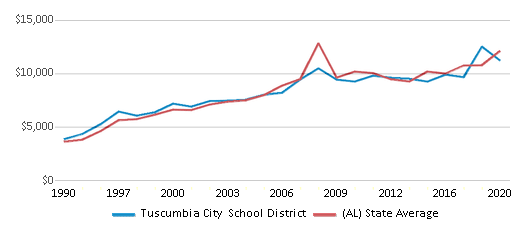
Spending / Student (19-20)
$11,254
$12,220
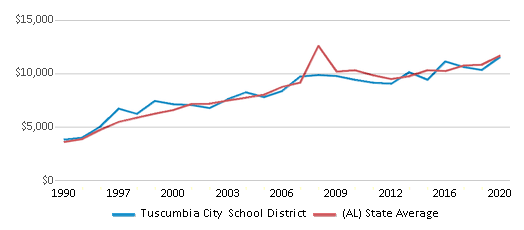
Best Tuscumbia City School District Public Preschools (2025)
School
(Math and Reading Proficiency)
(Math and Reading Proficiency)
Location
Grades
Students
Rank: n/an/a
601 Joe Wheeler Hwy
Tuscumbia, AL 35674
(256) 389-2940
Tuscumbia, AL 35674
(256) 389-2940
Grades: PK-2
| 428 students
Recent Articles

Year-Round Or Traditional Schedule?
Which is more appropriate for your child? A year-round attendance schedule or traditional schedule? We look at the pros and cons.

Why You Should Encourage Your Child to Join a Sports Team
Participating in team sports has a great many benefits for children, there is no doubt. In this article you will learn what those benefits are.

White Students are Now the Minority in U.S. Public Schools
Increasing birth rates among immigrant families from Asia and Central and South America, combined with lower birth rates among white families, means that for the first time in history, public school students in the United States are majority-minority. This shift in demographics poses difficulties for schools as they work to accommodate children of varying language abilities and socio-economic backgrounds.





